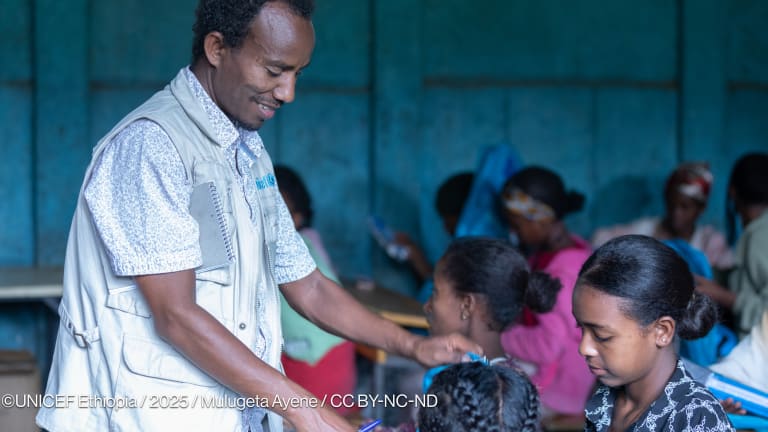Global development’s next decade: Evolution or revolution?
Will the global development industry fundamentally change in the next 10 years? A Devex survey of more than 800 senior executives shows that 63 percent of them agree, citing broad shifts in the global context as the key drivers of this transformation.
This article is part of The Future of Global Development, a series for Devex Executive Members that explores what development leaders think of the industry’s top issues. Global development has come a long way since the Millennium Development Goals were set in 2000. Not only have great strides been achieved in improving the living conditions of some of the world’s most deprived populations, but initiatives to tackle the root causes of poverty have also flourished at an unprecedented scale. Amid sky-high expectations surrounding the post-2015 development agenda, many development executives see their industry facing noteworthy changes. Devex’s 2014 Development Influencers Survey found that about two-thirds of senior managers believe the global aid industry will undergo a fundamental transformation in the next decade. According to survey respondents who foresee an industry transformation, broad changes like fluctuating power structures, rising development actors and new technology will contribute to an overhaul of the development arena. The rise of developing countries Our recent survey revealed that among the executives who think the industry will transform, 26 percent picked the growth of developing countries as the top reason for change. As their economic influence and political clout increase, nations from the “global south” are increasingly challenging the dominance of Western donor governments, most notably by imposing different development paradigms. “[There is] a movement away from an exclusive ‘north-funds-south’ model to creating more opportunities for south-to-south development cooperation as well as new types of partnerships and fundraising from emerging middle classes in the developing world,” Helene Gayle, CARE USA’s president and CEO noted. With three-quarters of the world’s poorest now living in middle-income countries, the rise of these emerging economies has changed patterns of inequality and put pressure on the established aid system to rethink how it works. A quick look at the resources of emerging markets further illustrates their potential to be key agents of change. According to the U.N. Development Program’s 2013 Human Development Report, developing countries now hold two-thirds of the world’s $10.2 trillion in foreign exchange reserves — a minor share of which could have a significant impact on development finance. “Even if aid budgets in the West were to go up, [which is] doubtful, they’ll be an ever smaller part of budgets in the developing world simply because gross domestic product is increasing so much faster in the developing than the developed world,” Charles Kenny, former World Bank economist and senior fellow at the Center for Global Development, told Devex. New actors and new technology Of the executives who thought development would change fundamentally, 20 percent responded that the growing number and dynamism of new actors — emerging donors, philanthropic foundations and private entrepreneurs — would be the leading reason, and 18 percent pointed to technology as the top factor. Tom Murphy, international development beat reporter at Humanosphere and co-founder of the Development and Aid World News Service, said he thought emerging economies and new technology would lead to a greater focus on accountability. “NGO X will get real-time feedback from its beneficiaries through social media and other tools,” Murphy said. “They can no longer say they did one thing when another thing happened on the ground.” At a time when fundamental questions remain about what really matters in development, respondents said they thought new actors will spur reflection and reform. As for new technology, improved information and communication tools are already revolutionizing development work — making it more collaborative, integrated and informed. “Social media makes it possible to experiment with new forms of getting the public involved in the fight against poverty and social justice,” CARE USA’s Gayle told Devex. “I’m sure many of us in the development space are conjuring up our own version of the ice bucket challenge.” Deep-rooted internal resistances? Roughly a third of development executives Devex surveyed believe global development will not experience a transformation in the upcoming decade. These respondents think changes to the international aid system will only be incremental, with deep-rooted resistances inherent to the sector — notably donor politics, bureaucracy, risk aversion and entrenched interests — preventing major shifts. “The aid industry as a whole is too big and lumbering to make quick changes anytime soon … I would probably put my money on things staying more the same than changing,” Murphy said. CGD’s Kenny agreed. “Aid decisions are still driven by national security concerns and domestic interest groups … and I don’t see why that will change particularly rapidly over the next 10 years,” he said. Ultimately, international aid will have to confront some of its internal dilemmas to ensure its continued relevance, a status quo that is not unprecedented. “The development challenges faced by the planet have always been in flux, as have the global responses to them,” said James Boomgard, president and CEO of Development Alternatives, Inc.. “People in the development field are keenly aware of the latest set of forces driving this challenge-and-response dynamic, including long-term shifts in the distribution of political and economic power, conflict and fragility in parts of the developing world, the advance and democratization of technology and the surge in talent and capacity in many emerging nations.” Do you believe global development will fundamentally change in the next decade? Join the conversation by leaving a comment below or tweet us at #futuredev. What do nearly 1,000 senior-level executives from NGOs, donor agencies, corporations and the public sector think about the future of global development? View our complete series — featuring exclusive insights and interviews with top executives — to find out.
This article is part of The Future of Global Development, a series for Devex Executive Members that explores what development leaders think of the industry’s top issues.
Global development has come a long way since the Millennium Development Goals were set in 2000. Not only have great strides been achieved in improving the living conditions of some of the world’s most deprived populations, but initiatives to tackle the root causes of poverty have also flourished at an unprecedented scale.
Amid sky-high expectations surrounding the post-2015 development agenda, many development executives see their industry facing noteworthy changes. Devex’s 2014 Development Influencers Survey found that about two-thirds of senior managers believe the global aid industry will undergo a fundamental transformation in the next decade.
This story is forDevex Promembers
Unlock this story now with a 15-day free trial of Devex Pro.
With a Devex Pro subscription you'll get access to deeper analysis and exclusive insights from our reporters and analysts.
Start my free trialRequest a group subscription Printing articles to share with others is a breach of our terms and conditions and copyright policy. Please use the sharing options on the left side of the article. Devex Pro members may share up to 10 articles per month using the Pro share tool ( ).
Manola De Vos is an Engagement Lead for Devex’s Analytics team in Manila. She leads and designs customized research and analysis for some of the world’s most well-respected organizations, providing the solutions and data they need to grow their partner base, work more efficiently, and drive lasting results. Prior to joining Devex, Manola worked in conflict analysis and political affairs for the United Nations, International Crisis Group and the EU.








